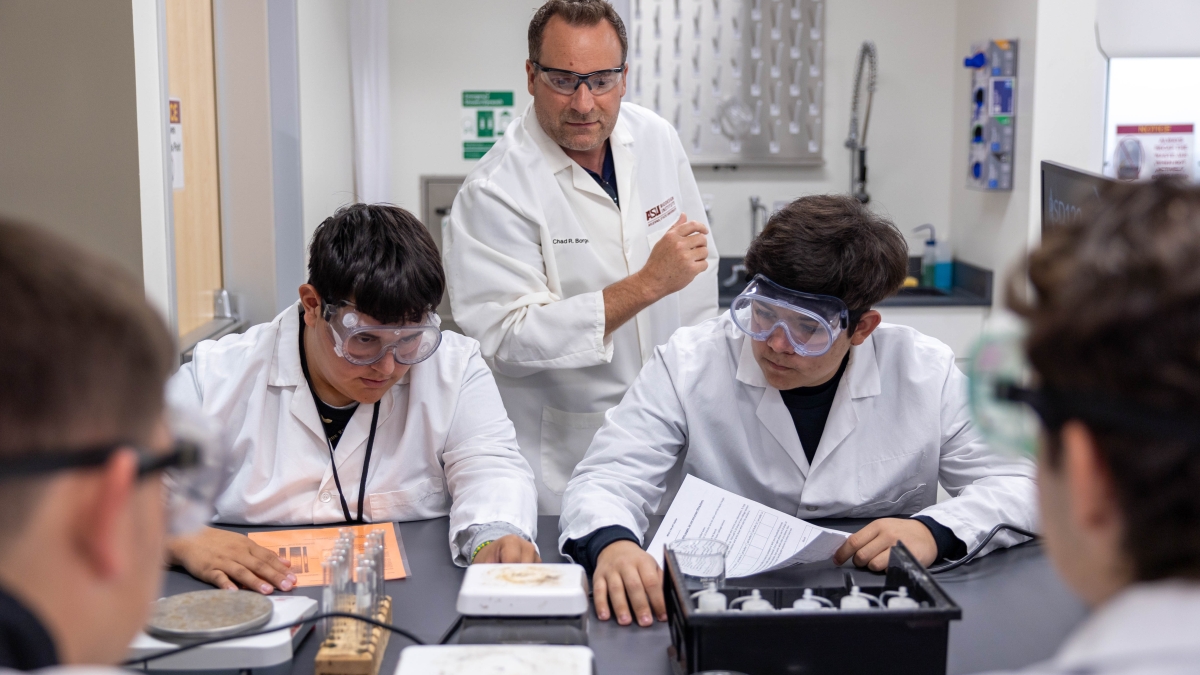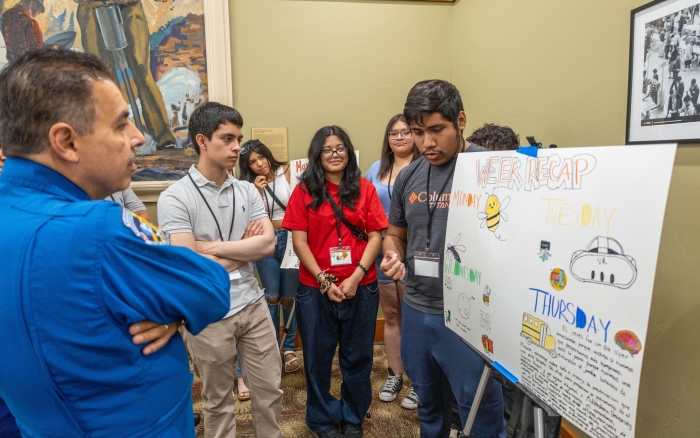4 ASU programs earn national recognition for expanding access to STEM degrees

Chad Borges, associate professor in the School of Molecular Sciences, helps Migratory Student Summer Academy participants with a lab project on ASU’s Tempe campus on July 5. Photo by Dustin Davila-Bojorquez/ASU
Four programs at Arizona State University have been awarded the 2024 Inspiring Programs in STEM Award by Insight Into Diversity magazine.
The award honors colleges and universities that encourage and assist students from underrepresented groups to enter the fields of science, technology, engineering and mathematics.
The programs awarded are:
Migratory Student Summer Academy
Migratory Student Summer Academy is an Arizona Department of Education-funded enrichment program that encourages high-school-aged children of migrant seasonal farmworkers to think about futures in STEM.
Online Undergraduate Research Scholars
The College of Liberal Arts and Sciences and EdPlus have developed the Online Undergraduate Research Scholars, or OURS, program to address the pressing challenge of offering quality research opportunities to ASU Online students at scale.
Future Leaders and Geoscience High-Road Internship Program
Future Leaders and Geoscience High-Road Internship Program, or FLAGSHIP, is a 10-week program funded by the National Science Foundation and is a collaborative effort of ASU and the American Geophysical Union. FLAGSHIP seeks to involve students from groups historically underrepresented in the sciences, including Black or African American, American Indian or Alaska Native, Hispanic or Latino, female, first-generation college students, veterans and students with disabilities. FLAGSHIP also welcomes LGBTQ+ students and students who have experienced, and worked to overcome, educational or economic disadvantages that may complicate their continued progress in academic or research careers.
College Assistance Migrant Program
The College Assistance Migrant Program, or CAMP, provides academic support to students from migrant and seasonal farmworker backgrounds during their first year in college. CAMP identifies, recruits and enrolls students to attend ASU. The program provides these students with academic, social and financial support to enable the completion of their first year of college.
"Recognition of these four exceptional programs reaffirms ASU's commitment to making higher education accessible for all,” said ASU Executive Vice President and University Provost Nancy Gonzales. “These awards highlight the importance of providing inclusive educational opportunities — particularly in STEM fields — to students from underrepresented populations.
"Perspectives from all backgrounds in STEM are necessary to enrich the field and drive innovation. This recognition underscores the critical role our programs play in fostering an environment where every student can thrive and achieve their full potential."
Award winners were selected by Insight Into Diversity based on efforts to inspire and encourage a new generation of young people to consider careers in STEM through mentoring, teaching, research and successful programs and initiatives.
More than 700 students have participated in these ASU programs since spring 2022.
For example, this summer, 70 high school students participated in a weeklong Migratory Student Summer Academy (MSSA) program that focused on futures in STEM and culminated with a talk by astronaut José Hernández.
“The award will raise awareness about the challenges faced by children of migrant farmworkers and highlight the importance of providing them with equitable educational opportunities,” said Gilberto Lopez, Charter Professor at ASU’s School of Transborder Studies. “This recognition can open new opportunities for our students, such as scholarships, internships and mentorship programs, by drawing attention to their potential. Hopefully, this award will inspire our students to continue pursuing their STEM interests and dreams, knowing that they have the support and recognition of a broader community.”
For many of these students, said Lopez, MSSA is their first exposure to what a university education can offer and provides them with access to valuable information about available resources. The program gives students a realistic sense of what college life will be like, fostering their aspirations and making higher education feel attainable. The award underscores the impact of MSSA for students who might not have otherwise considered a future in higher education.
“We recognize that optimal access to STEM education starts well before students start college and then continues through the support and opportunities provided during a student’s college career,” said Amalia Pallares, vice provost for Inclusive Excellence at ASU. “We are thrilled to see ASU being recognized for its impactful initiatives with both high school and college students.”
“We know that many STEM programs are not always recognized for their success, dedication and mentorship for underrepresented students,” said Lenore Pearlstein, Insight Into Diversity owner and publisher. “We want to honor the schools and organizations that have created programs that inspire and encourage young people who may currently be in or are interested in a future career in STEM.
“We are proud to honor these programs as role models to other institutions of higher education and beyond.”
More Science and technology

Indigenous geneticists build unprecedented research community at ASU
When Krystal Tsosie (Diné) was an undergraduate at Arizona State University, there were no Indigenous faculty she could look to in any science department. In 2022, after getting her PhD in genomics…

Pioneering professor of cultural evolution pens essays for leading academic journals
When Robert Boyd wrote his 1985 book “Culture and the Evolutionary Process,” cultural evolution was not considered a true scientific topic. But over the past half-century, human culture and cultural…

Lucy's lasting legacy: Donald Johanson reflects on the discovery of a lifetime
Fifty years ago, in the dusty hills of Hadar, Ethiopia, a young paleoanthropologist, Donald Johanson, discovered what would become one of the most famous fossil skeletons of our lifetime — the 3.2…
